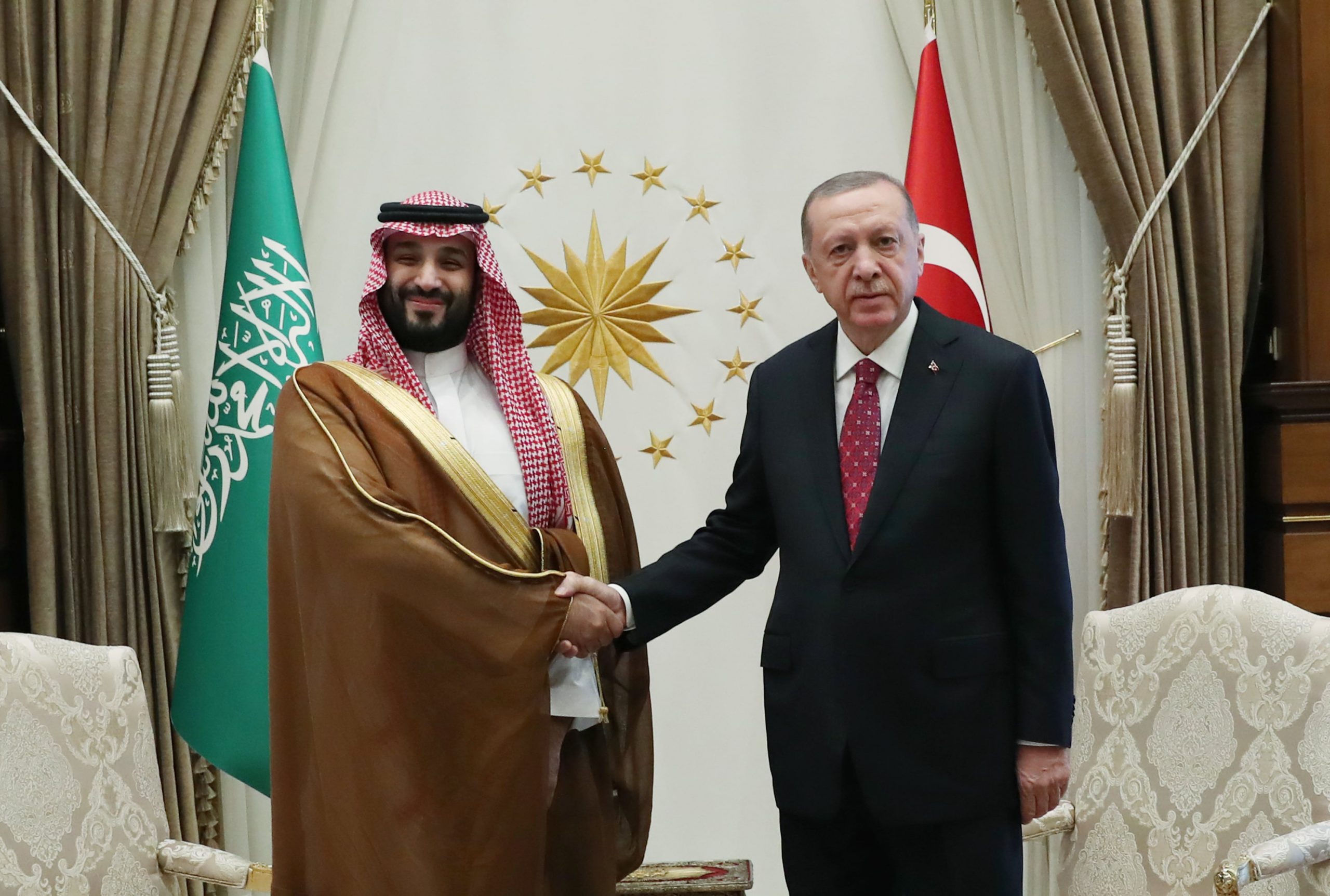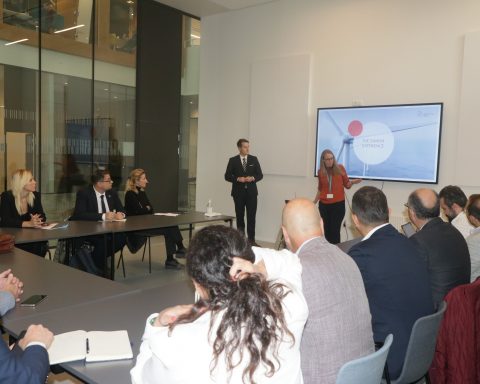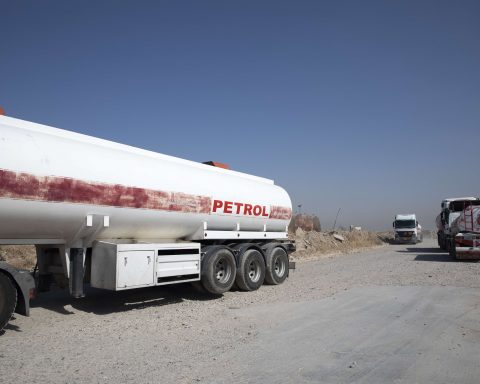Relations between Türkiye and Saudi Arabia have improved as part of the Middle East’s current trend of improving bilateral political relations. On April 28-29, Turkish President Recep Tayyip Erdogan and a high-level delegation visited Jeddah and Mecca in Saudi Arabia. The Crown Prince of Saudi Arabia, Mohammed bin Salman, and his high-level delegation then paid a visit to Ankara on June 22, bringing political normalization to its pinnacle.
Following these visits, ties between the two nations continued to strengthen in several sectors. Following the reaffirmation of the two nations’ political and security cooperation, normalized ties flourished in sectors like education, inter-institutional cooperation on religious relations, faith tourism, and sports.
Political issues and concerns over regional politics between Türkiye and Saudi Arabia began to mend in 2021. The re-establishment of political ties between the two nations, both between different state institutions and governments, influenced the sectors affected by normalization. In this context, the closure of Turkish schools where there were disagreements in Turkish-Saudi relations between 2016 and 2021, the difficulties for Turkish businessmen and traders, the procedures for importing Turkish goods into the country, and restrictions and difficulties in other social areas began to be overcome with normalization.
In this regard, on the days that the two leaders and delegations met, Saudi Arabia removed the travel prohibition to countries such as India, Ethiopia, and Vietnam, as well as Türkiye, as part of the relaxation of COVID-19 measures. Following the lifting of the travel restriction, initiatives were made to promote economic activity between Türkiye and Saudi Arabia, as discussed in bilateral negotiations earlier. The hosting of the Türkiye and Saudi Arabia Business and Investment Roundtable Conference was one of the first steps in this area.
With the meeting, the two nations’ business circles once again opened the ground for mutually beneficial cooperation. In the short term, commerce between the two nations is likely to expand more than during the period when relations were strained. With the possible next meetings in Türkiye and Saudi Arabia, it is envisaged that Turkish businesspeople and firms would re-enter the Saudi economy in a variety of sectors, including food, technology, and construction.
The education sector was another area where ties between the two nations improved. Turkish schools that were shut down in Saudi Arabia will reopen, according to a recent official announcement from the Ministry of National Education of the Republic of Türkiye. After the 2020–21 academic year, Turkish schools in Saudi Arabia were shut down. In this regard, it is anticipated that the international Turkish schools in Riyadh, Jeddah, Taif, Mecca, Medina, Tabuk, Abha, and Dammam will resume their educational activities in the upcoming term. The return of instructional and educational activities in Turkish schools has an impact beyond solely the two nations’ educational relations.
At the same time, the fact that the employment contracts of employees in Turkish schools may have been canceled with the closure of the schools also necessitated the return of some employees to Türkiye. In this context, the compensation of damages that may have arisen from the issue of employment contracts will also strengthen the social relations between the two countries. In addition, another development that can increase the social relations between the two countries is the increase in direct flights between the cities of the two countries. As a matter of fact, within this framework, Saudia Airlines, the national airline of Saudi Arabia, began to fly to Türkiye again after a two-year break. At the same time, it was agreed by the authorities of the two countries on the issue of visa facilitation, which will ensure the development of both commercial and social relations.
The relationship between religious organizations and religious/faith tourism is one of the developments in Turkish-Saudi ties. Saudi Arabia significantly restricted the Hajj pilgrimage during the global pandemic, and for a while, certain quotas were only available to Saudi nationals. The requirements related to the performance of pilgrimage were lifted as a result of the global pandemic falling below the level at which actions needed to be taken to a great extent and the rise in vaccination rates on a local and global scale. The number of prospective pilgrims who can participate in the pilgrimage in 2022 has been set at one million by Saudi Arabia.
In this framework, a quota of approximately 40,000 was reserved for Türkiye. In addition, Sheikh Abdurrahman al-Sudais, President of the Affairs of the Two Holy Mosques, stated that Turkish is also included in the language training given to the officials to meet the services to be provided to the prospective pilgrims from every country. This framework is aimed to render the related services easier for Turkish prospective pilgrims. In addition, recently, on the point of relations between religious institutions, upon the invitation of Saudi Arabia, the President of the Turkish Directorate of Religious Affairs Prof. Dr. Ali Erbaş also gave a speech at a panel on pilgrimage after the global pandemic in Saudi Arabia.
Sports is one of the areas where ties between the two nations have improved. In light of the circumstances, it is clear that Saudi Arabian football teams have recently begun to favor Türkiye as a camping location. In this regard, the Al Ahli football team from Saudi Arabia held its preseason training camp in Türkiye. In light of this, it is reasonable to assume that “football diplomacy” could be significant in Turkish-Saudi ties. In that respect, Saudi Arabia’s Crown Prince Mohammed bin Salman and Russia’s President Vladimir Putin watched the opening game between Russia and Saudi Arabia during the 2018 World Cup matches hosted in Russia. In this context, it can be stated that the countries of the region do not consider sports activities separately from diplomacy. As a matter of fact, at this point, Saudi Arabia also participated in the Islamic Solidarity Games organized by the member states of the Organization of Islamic Cooperation in Konya, Türkiye. This would also increase Turkish-Saudi sports cooperation.
In light of all of this, it can be said that Türkiye and Saudi Arabia’s bilateral relations have improved in several ways, including the facilitation of commercial activities, the positive direction of developments in the education sector, the facilitation of faith tourism, the development of relations between religious institutions, and sports activities.













